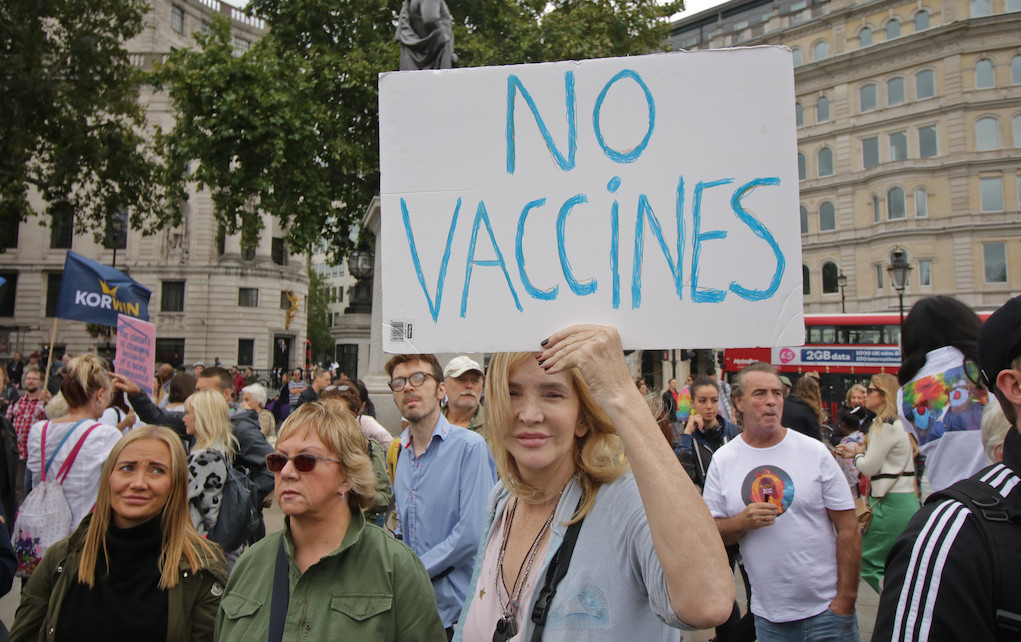I’m perplexed by protests like those in Montreal that shut down a vaccine clinic in the name of freedom and liberty, or the Alberta rodeo that defied health rules because, someone said, “It’s better to die on your feet than live on your knees.” I don’t really get how wearing a mask is living on your knees, but I know many mean it sincerely. Humans are meaning-seeking missiles often willing to risk much — or all — for the sake of some highly symbolic issue.
It’s “freedom” as their focus that’s especially perplexing; it’s so amorphous.
There’s a homey adage that says your freedom to swing your fist ends where my nose begins. Fair enough. More pompous renditions distinguish negative and positive freedoms, then try to maximize each individual’s freedoms while preventing the state or someone from spiriting them away.
But what I find irritating about these approaches is they start from some pristine individual state where you’ve received your freedoms from the get-go and try to hang onto or expand them, while others try to strip them away. It’s always about freedom, revolving around noble, self-serving heroic individuals.
I just don’t think that kind of personalized, self-centred starting line is what most people experience. I think there are better frameworks for figuring out what your life challenges look like and how to meet them. One would be the German philosopher Heidegger’s notion of Geworfenheit (say the “w” as a “v”).
True, Heidegger was a despicable Nazi with other problematic traits. But he had some decent ideas. Geworfenheit means “thrownness” and refers to how none of us chose to be who or where we are. We arrive in the world, right from the start, as if we were tossed into a situation we never chose and then must figure out how to deal with it. Then that keeps reoccurring; we’re always already “situated.” Marx made that point when he said humans make their own history, but never in circumstances of their own choosing.
So instead of always starting at some pure point where I’m at the centre — along with my precious freedoms that I’m trying to protect — we’re often tossed into a situation, like a pandemic, that doesn’t really fit the “freedoms” model. You can try responding in terms of your insatiable appetite for freedom, but that might be a stretch. Freedom might not be totally irrelevant then, but it mightn’t be very relevant either, as you search for a way to handle the new “situation.”
Take Nomadland, which got this year’s Oscar for best picture. The book it’s based on was about Americans shortly after the 2008 financial crash, who lived in their vans or pickups because they were “houseless” and made the best of it. They helped each other and embodied the classic American move of “lighting out for the territories,” which evokes an archetypal U.S. sense of freedom. (Except for the main character in the movie, Fern, who had a personal safety net.)
By the time the movie was made, though, as reviewer Jack Hamilton noted, it was Trump time there, and things had shifted. The same people who’d admirably asserted their personal freedom were now expected to chant “build that wall” and “lock her up.” The issue wasn’t mainly their personal freedom any more — it had swung to matters like racism, exclusion, democracy. They’d been geworfed to another situation in which freedom as a focus wasn’t as pertinent.
Freedom is just too fluid to be your political or ethical Swiss Army knife.
Long ago, in another era when freedom was a watchword, I worked at a summer camp and decided to introduce the concept of freedom from a famous British “free school,” Summerhill. The kids wouldn’t even have to make their beds.
One evening I returned from a day off. Campers ran up saying, “Hey Rick, did you hear about the new freedom — unlimited tuck!” They’d voted in my absence that anyone could spend their full summer allowance for candy at the tuck shop in one go. I guess they felt that having freedom handed them was less satisfying than seizing it. So there you have it, with apologies to Kris Kristofferson: freedom’s just another word for unlimited tuck. Sometimes, anyway.
Rick Salutin writes about current affairs and politics. This column was first published in the Toronto Star.
Image credit: Steve Eason/Flickr



